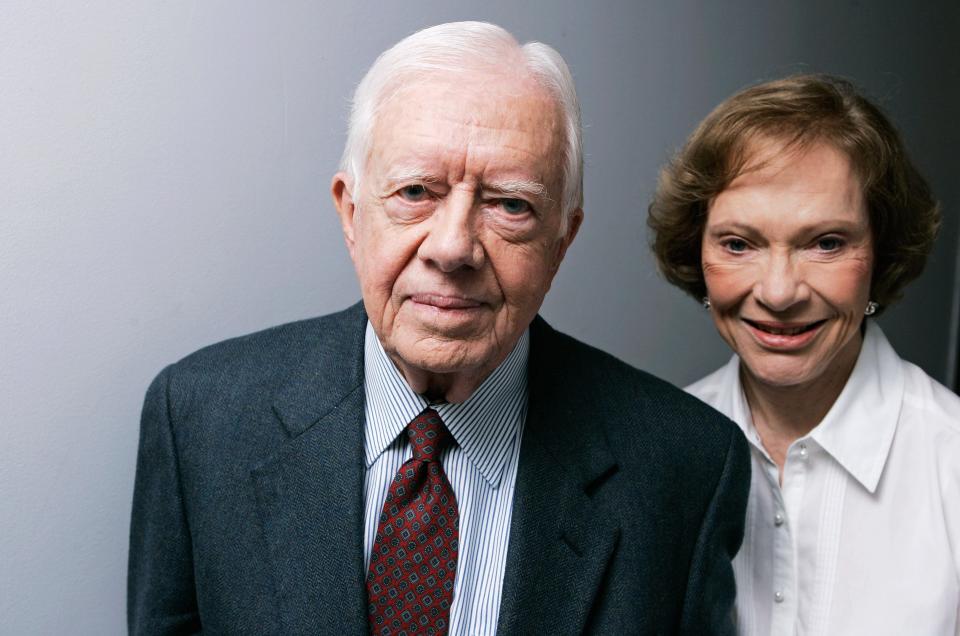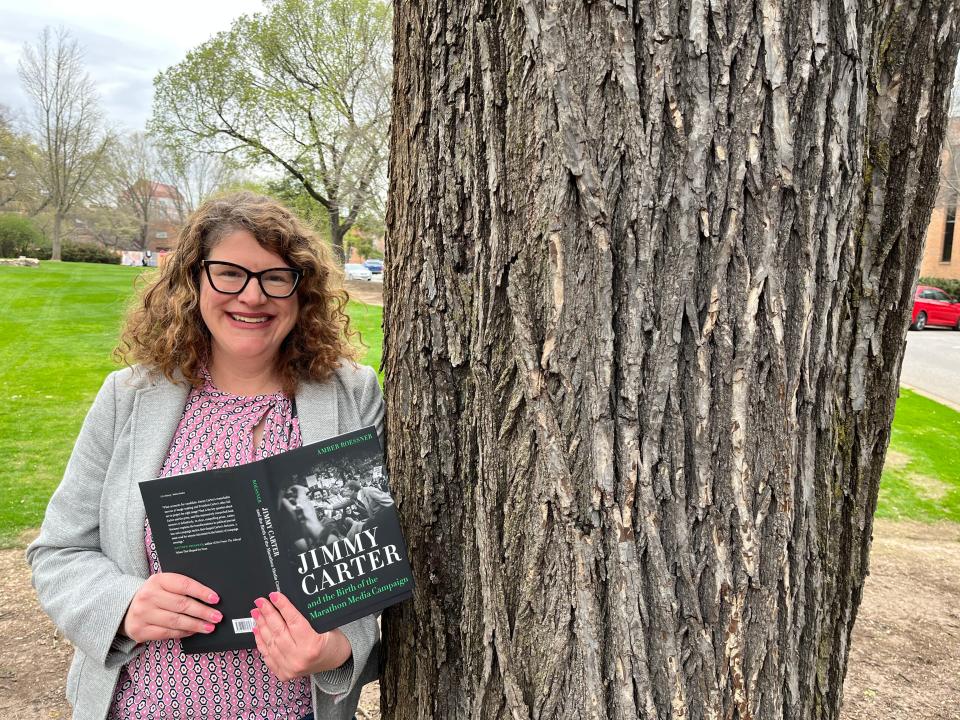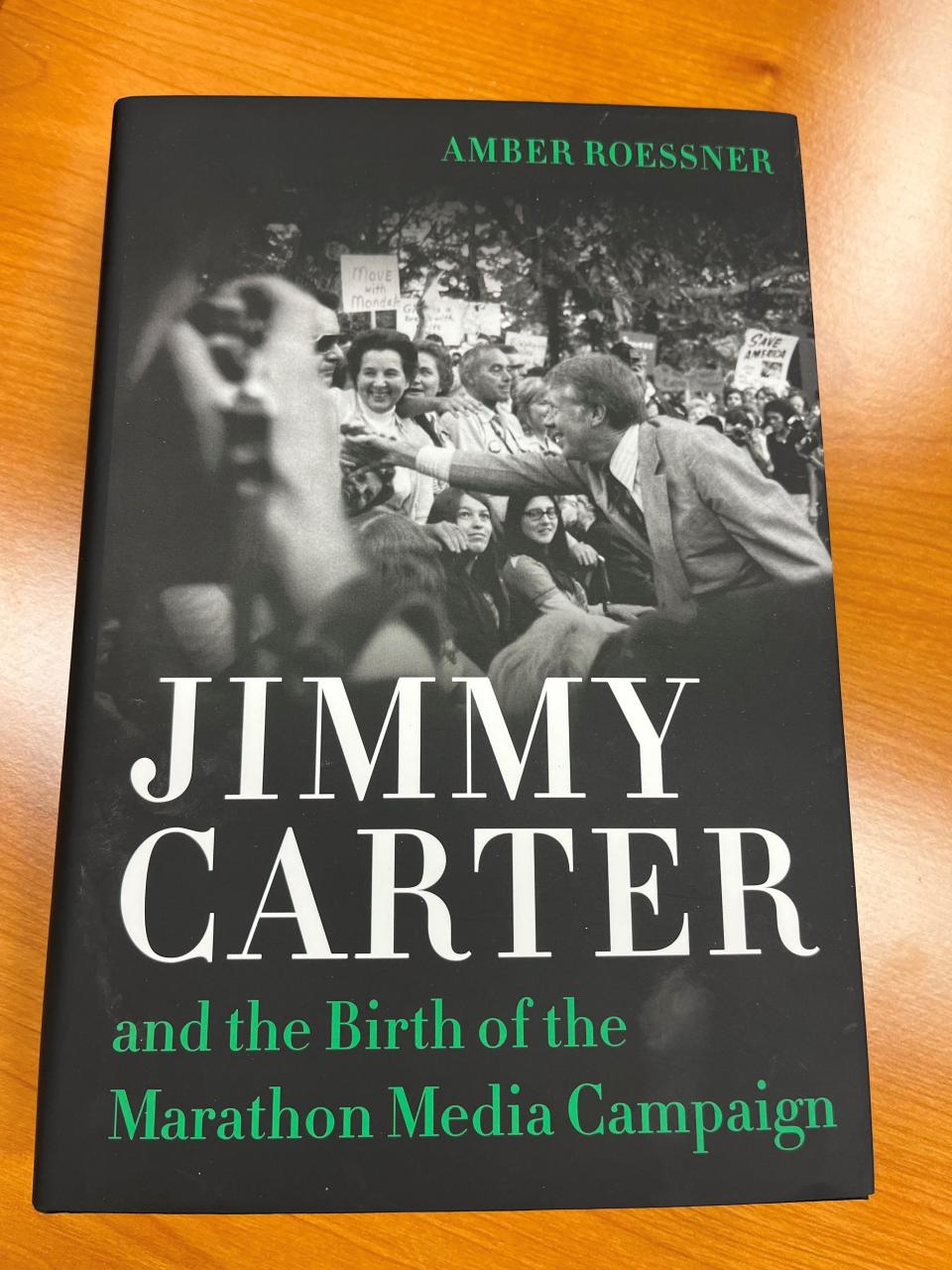Jimmy Carter's 'piercing blue eyes' and friendly manner put this UT professor at ease
- Oops!Something went wrong.Please try again later.
Former President Jimmy Carter’s teeth and smile were always highlighted in editorial cartoons, just as Barack Obama’s ears and Donald Trump’s hair have been.
But for Knoxville Carter biographer Dr. Amber Roessner, his blue eyes are what she remembers the most when she had an opportunity to interview him for her book in 2014 at the Carter Center in Atlanta.
“When I walked through his office door, he was hunched over with his back turned away from me, and as he turned toward me, his piercing blue eyes, the ones journalists commented on during his campaign and presidency, instantly appraised me,” she recalled.
While she was admittedly a little nervous as anyone getting a rare opportunity to meet with a current or former president would be, this man known for his generally amicable manner quickly put her at ease.

“Carter tried to calm my nerves by sharing that he had thoroughly enjoyed my first book, ‘Inventing Baseball Heroes,’ and had often traveled through my hometown of Winder, Georgia,” she added.
In fact, he was so accommodating, the meeting became almost as much a friendly conversation as an interview.
“In the end, he was extremely kind, gracious with his time, and eager to set the record straight about his relationship with the press,” she said.
As people continue to remember the 98-year-old former president after Carter officials announced that he is now on hospice care, Roessner has been reflecting on that meeting and his contributions to the country.

As a fellow former Georgian and UT School of Journalism and Electronic Media professor, she had naturally taken an interest in his dealings with the press and the making of his image. Her 2020 LSU Press book, “Jimmy Carter and the Birth of the Marathon Media Campaign,” focuses through the examination of numerous documents and interviews on the crafting of his image before, during and after his presidency.
“I explore how he achieved what Time magazine called the greatest political miracle in U.S. history by rising from virtual unknown candidate to the presidency through his (un)celebrity media campaign that capitalized on his underdog victories during the invisible primaries and the official 1976 election season,” she said.
At a time when the Watergate scandal of Richard Nixon was still on people’s minds, giving both Democrats and Washington outsiders better opportunities to seek the presidency, the former Georgia governor narrowly edged incumbent Gerald Ford. And this openly Christian man had done it through some outside-the-box thinking, like granting an interview with Playboy magazine.
As president, though, he ended up presiding over a struggling economy, the Soviet Union's invasion of Afghanistan and the taking of American hostages by revolutionaries in Iran. As a result, voters in 1980 chose Ronald Reagan in a landslide after he in his naturally communicative style asked them if they were better off now than four years earlier.
In 1981, when Carter left office, his presidency had been considered overall a failure. But both the passing years and Carter’s continued altruistic work – from volunteering with Habitat for Humanity to helping monitor democratic elections in other countries – has changed people’s perspective of him, some believe.
Roessner said that the perspective began to change in the 1990s, and that he is now considered to be one of the most successful one-term presidents in American history.

“He was known for passing more legislation than any other president since Lyndon B. Johnson, for his role in deregulating transportation, for his role as the primary architect of the Camp David Accords, for his role as a champion of energy conservation and environmental protections, for the way that he lifted women and people of color into positions of power in government, and for his role as a champion of human rights around the globe,” she said.
And his assessment as a person might be even higher.
As Roessner added, “President Jimmy Carter will be remembered as a beloved champion of human rights, a man of the highest moral character committed to serving his country and his community with all of his might.”
In doing that, he combated disease, hunger, poverty, conflict and oppression around the globe and in his spare time taught the gospel and built houses for the poor, she concluded.
This article originally appeared on Knoxville News Sentinel: When a University of Tennessee professor interviewed Jimmy Carter

